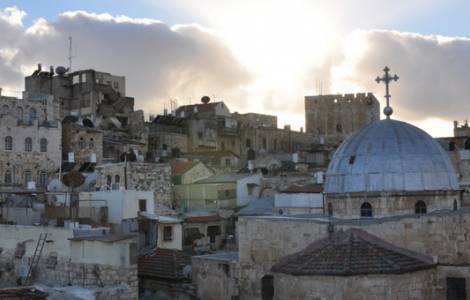Jerusalem – The Heads of Churches and ecclesial communities present in Jerusalem express “great surprise” at the speed with which the Supreme Court of Israel expressed itself in favor of the Jewish Ateret Cohanim “extremist group”, definitively rejecting the appeal presented by the Greek Orthodox Patriarchate of Jerusalem to block the acquisition – denounced as illegitimate – of three buildings on behalf of the Jewish organization, in the Christian area of the Old City of Jerusalem. According to the judgment issued by the Court on Monday 10 June, the properties of the Greek Orthodox Patriarchate were legitimately acquired by foreign intermediaries acting on behalf of Ateret Cohanim. In a joint statement, signed by 13 Patriarchs and heads of Churches and Christian communities present in the Holy Land, the initiatives of the Jewish association Ateret Cohanim aimed at obtaining real estates in the Christian part of the Old City of Jerusalem represent an attack “not only to the property rights of the Greek Orthodox Church of Jerusalem”, but also to the status quo that regulates the relations among the different religious communities in the Holy City, and risk becoming a “threat” to the local Christian presence.
The three buildings in question, the subject of legal disputes, which lasted a total of more than 14 years, are located near Jaffa Gate, considered the most direct entrance to access the Christian area of the Old City of Jerusalem. If members of Ateret Cohanim take possession of those properties – the signatories of the document point out – tension may emerge in one of the passageways most used by local Christians and pilgrims who want to reach the Basilica of the Holy Sepulcher and the other Christian Holy Places scattered in the Old City of Jerusalem.
The document is signed, among others, by the Greek Orthodox Patriarch Teophilos III of Jerusalem, by Archbishop Pierbattista Pizzaballa, Apostolic Administrator of the Latin Patriarchate of Jerusalem, and by Father Francesco Patton, Custos of the Holy Land. Patriarchs and Heads of the Churches of Jerusalem declare that they support the enduring efforts of the Greek Orthodox Patriarchate in order not to lose control of the disputed buildings, even after the Supreme Court ruling, and reiterate their conviction that the presence of lively Christian communities in Jerusalem is a decisive factor in order to preserve the “mosaic” of society historically characterized by the coexistence of the three monotheistic faiths.






